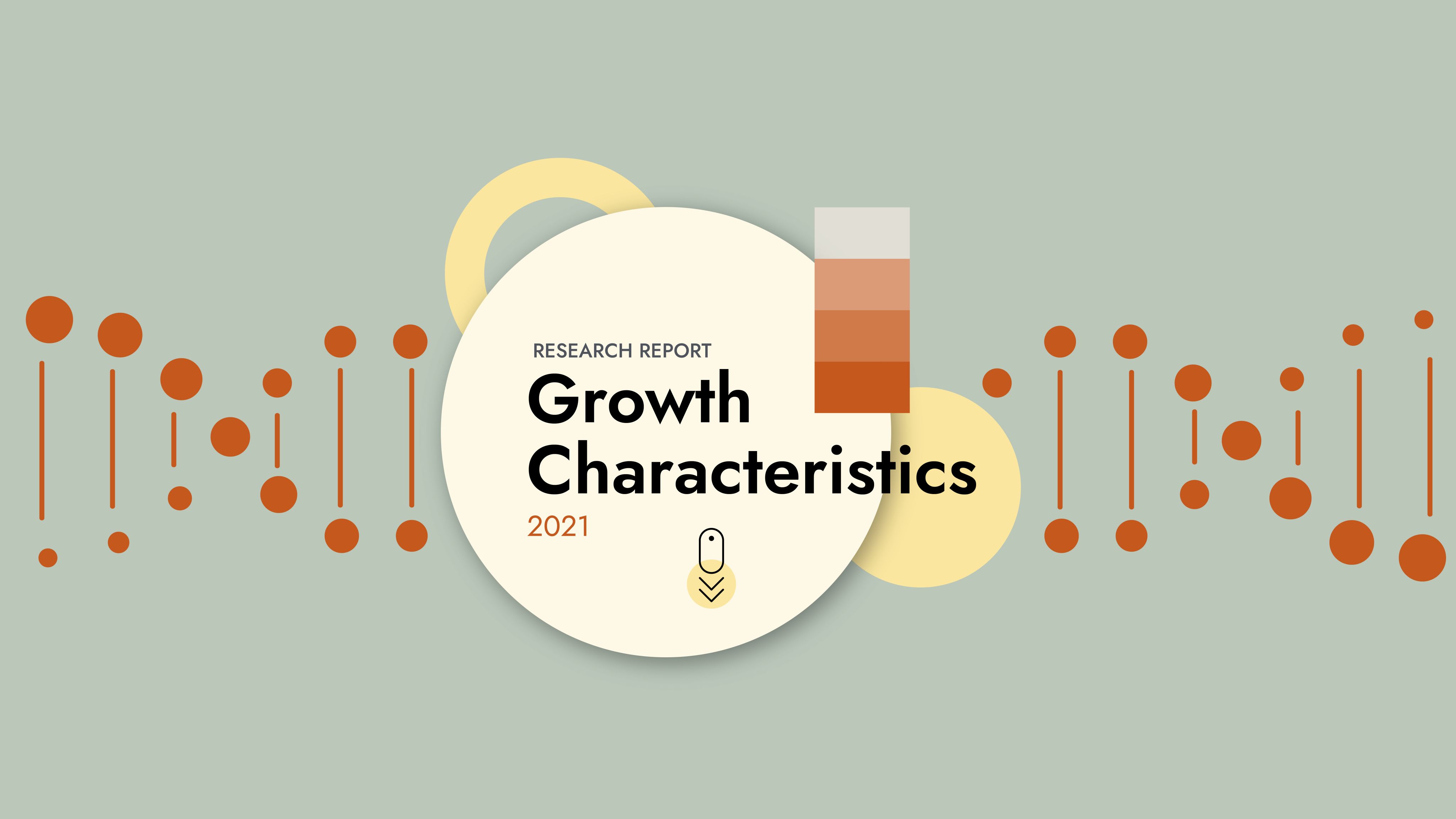
Introduction
Great leadership skills have been essential for CEOs navigating their businesses through the last 18 months. But what makes a great business leader?
In our first Growth Characteristics report, we wanted to get under the skin of growth business CEOs to find out the background, traits and motivations of the people who have navigated UK businesses through the pandemic, and the challenges and opportunities that they have faced.
One of the consequences of the Covid-19 crisis has been that Boards have been forced to be more transparent, communicate more and bring company values to the fore. Whilst everyone’s pandemic was different, it was also a time of shared challenges and where the compassion and personalities of leaders became both more visible and more important.


Introduction
Great leadership skills have been essential for CEOs navigating their businesses through the last 18 months. But what makes a great business leader?
In our first Growth Characteristics report, we wanted to get under the skin of growth business CEOs to find out the background, traits and motivations of the people who have navigated UK businesses through the pandemic, and the challenges and opportunities that they have faced.
One of the consequences of the Covid-19 crisis has been that Boards have been forced to be more transparent, communicate more and bring company values to the fore. Whilst everyone’s pandemic was different, it was also a time of shared challenges and where the compassion and personalities of leaders became both more visible and more important.


Building blocks of success
Whilst there are many routes to become a business leader, university education is, perhaps unsurprisingly, dominant with four-fifths of CEOs having a degree to their name. Nearly a third have taken their education further and have an MBA too, while 6% have a CFA.
Apprenticeships were also a significant entry point - proof that on-the-job learning is also important and university education is not the only route to becoming an industry leader.
Understanding customer wants and needs is crucial to business success, so it’s interesting to see that more than one in five business leaders worked in customer services after leaving education.




Traits of a successful CEO
When it comes to CEOs taking the Myers-Briggs personality test, it would be easy to imagine they might fit into an ‘ENTJ’, or a ‘Commander’ type role – individuals who are highly-driven, rational, and confident in their decisions.
However, when we asked growth CEOs what they considered to be the most important personality traits in a leader, they didn’t fit into that mould, and the ‘Executive’ profile seemed a better fit: stable leaders who provide solid direction during times of adversity, and who value dedication from their teams.
Realism topped our poll of key personality traits, with 25% of CEOs highlighting it as a top trait in a business leader. Successful CEOs seem to understand that you can’t pursue every opportunity. This became even more essential in larger companies, climbing to 35% of CEOs in businesses with 500 or more employees.
The desire for realism is supported by the - perhaps surprising - fact that fewer than one in 10 CEOs said that being enthusiastic or inspirational was a key characteristic for being a business leader. Leaders may recognise that more than just being figureheads, their focus is on delivering demonstrable results.
15% of female CEOs are likely to favour being dependable as a key characteristic, compared to 9% of men. Men were likely to think being sceptical was more important, with 14% agreeing it was important compared to 9% of women.
On average, CEOs spend almost six years in business before becoming CEO. In the North-West however, nearly one in six became CEOs in less than a year, an indication of the entrepreneurial spirit of the Northern tech hubs.




Traits of a successful CEO
When it comes to CEOs taking the Myers-Briggs personality test, it would be easy to imagine they might fit into an ‘ENTJ’, or a ‘Commander’ type role – individuals who are highly-driven, rational, and confident in their decisions.
However, when we asked growth CEOs what they considered to be the most important personality traits in a leader, they didn’t fit into that mould, and the ‘Executive’ profile seemed a better fit: stable leaders who provide solid direction during times of adversity, and who value dedication from their teams.
Realism topped our poll of key personality traits, with 25% of CEOs highlighting it as a top trait in a business leader. Successful CEOs seem to understand that you can’t pursue every opportunity. This became even more essential in larger companies, climbing to 35% of CEOs in businesses with 500 or more employees.
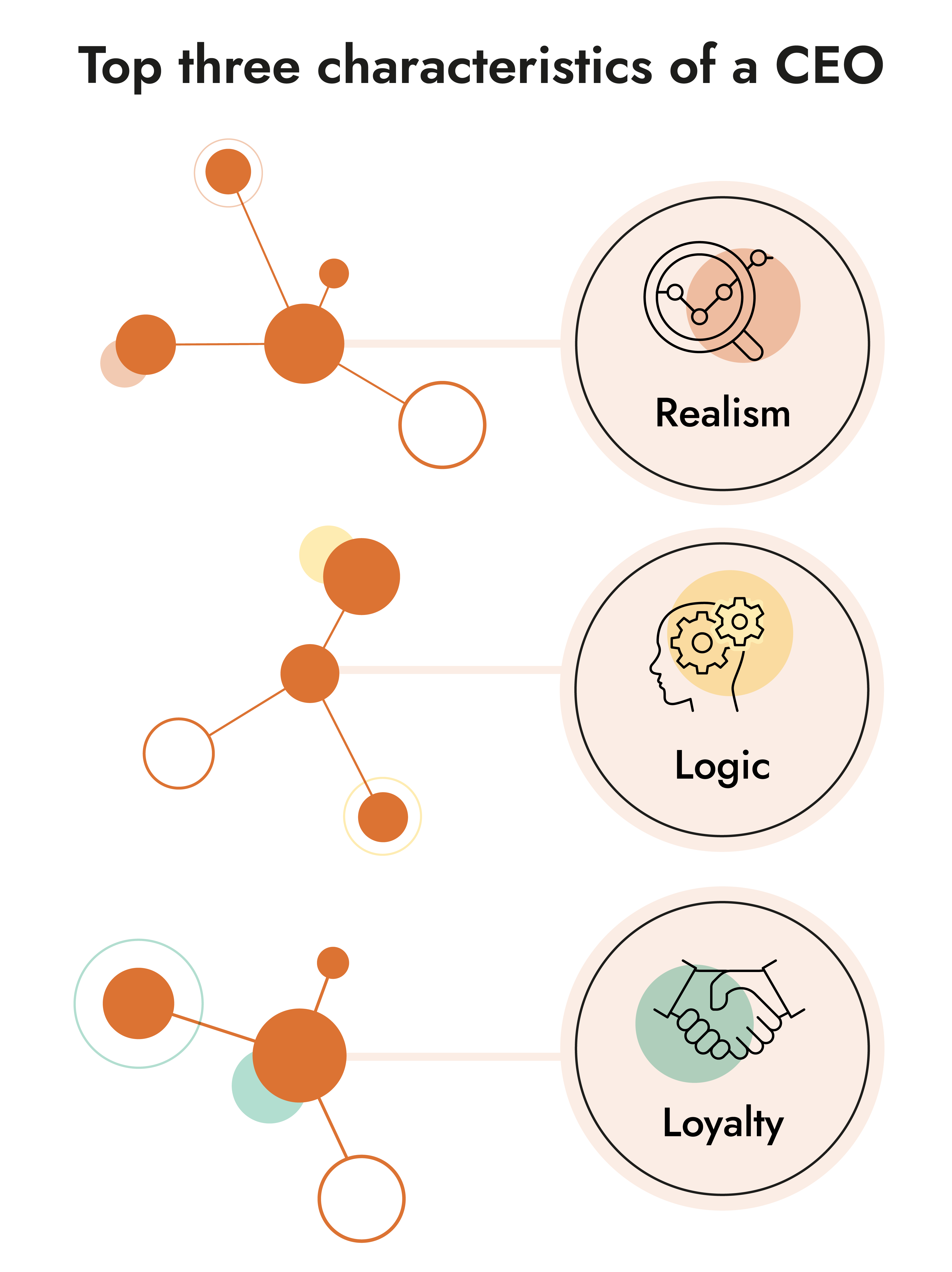
The desire for realism is supported by the - perhaps surprising - fact that fewer than one in 10 CEOs said that being enthusiastic or inspirational was a key characteristic for being a business leader. Leaders may recognise that more than just being figureheads, their focus is on delivering demonstrable results.
15% of female CEOs are likely to favour being dependable as a key characteristic, compared to 9% of men. Men were likely to think being sceptical was more important, with 14% agreeing it was important compared to 9% of women.
On average, CEOs spend almost six years in business before becoming CEO. In the North-West however, nearly one in six became CEOs in less than a year, an indication of the entrepreneurial spirit of the Northern tech hubs.

Skill development for CEOs
It would seem successful CEOs are made not born, with nearly a third saying leadership was the skill they had to develop most, followed by analytical and commercial thinking.

Successful CEOs also recognise that they can’t take on all tasks and building and delegating to a supportive team is a skill most have to master. Our research showed that nearly half said it was a skill they had learnt and are now comfortable with, but some still find it hard to let go, with nearly a fifth saying they still struggle to delegate to others.
Strategic thinking skills were strongest among CEOs of high growth companies, with only 4% of CEOs at the highest-growth companies we surveyed saying it was a skill they needed to develop. This compared to nearly a third of CEOs whose businesses had grown the least.


Skill development for CEOs
It would seem successful CEOs are made not born, with nearly a third saying leadership was the skill they had to develop most, followed by analytical and commercial thinking.

Successful CEOs also recognise that they can’t take on all tasks and building and delegating to a supportive team is a skill most have to master. Our research showed that nearly half said it was a skill they had learnt and are now comfortable with, but some still find it hard to let go, with nearly a fifth saying they still struggle to delegate to others.
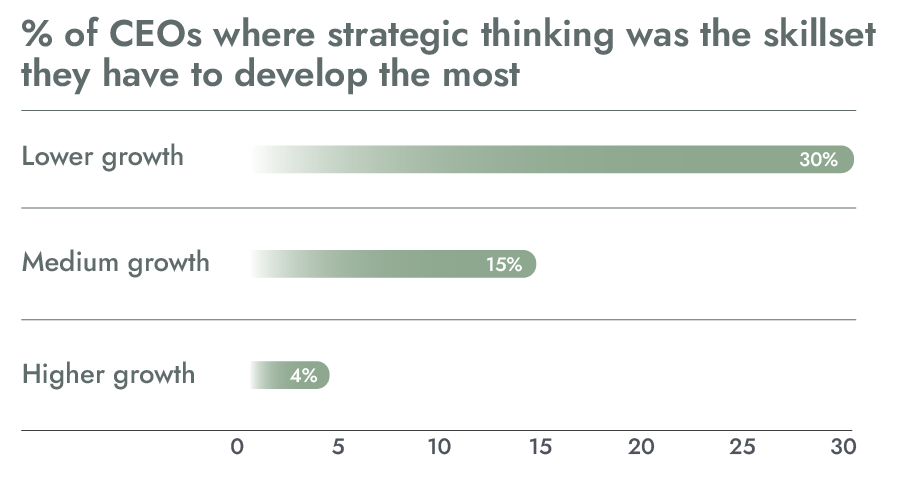
Strategic thinking skills were strongest among CEOs of high growth companies, with only 4% of CEOs at the highest-growth companies we surveyed saying it was a skill they needed to develop. This compared to nearly a third of CEOs whose businesses had grown the least.



People and culture
We’ve seen that CEOs are realistic, capable leaders who delegate effectively, but there’s no doubt that there’s also a lot of pressure. This has been especially true in the last year with the pandemic having significant impact across businesses – from sales to operations. However, 30% of CEOs say their mental health has improved since the onset of the pandemic and 44% felt it stayed the same, possibly as CEOs, like many of their staff, learnt the value of greater work/life balance during the pandemic.
The important question is how CEOs will carry the benefits they’ve discovered forwards, and how they can ensure wellbeing improvements are reflected across the entire business.
Research from the School For CEOs supports our findings that while CEOs broadly saw mental health improvements during the pandemic, other leaders in the business were more likely to suffer burnout. This means a need for sympathetic management from leaders and a need to continue to embrace tools such as engagement surveys, counselling support and internal communications, as well as other support structures that came to the fore during the pandemic.
A continuation of open and honest conversations about mental health is especially important as new ways of working emerge – whether that’s employees continuing to work from home, returning to the office or a hybrid solution that combines both.
Leaders have an opportunity to build on the strong mental health and wellbeing developments they have cultivated within their businesses during the pandemic. And of course, CEOs need to create leadership in diversity and inclusion too, creating teams and cultures that flourish and reflect the diversity of talent available to them.



Evolution of social purpose
As CEOs navigated through the crisis of the pandemic, the importance of social purpose, business values, and looking out for your people became paramount. Businesses that may have talked about caring about more than just their profits, had their statements put to the test.
Almost a third say that social purpose is now at the forefront of strategy, rising to a whopping 95% for CEOs of smaller businesses between 10 and 49 employees. Nearly half of all fast-growth businesses we surveyed say that social purpose is one of the priorities that informs their strategy.
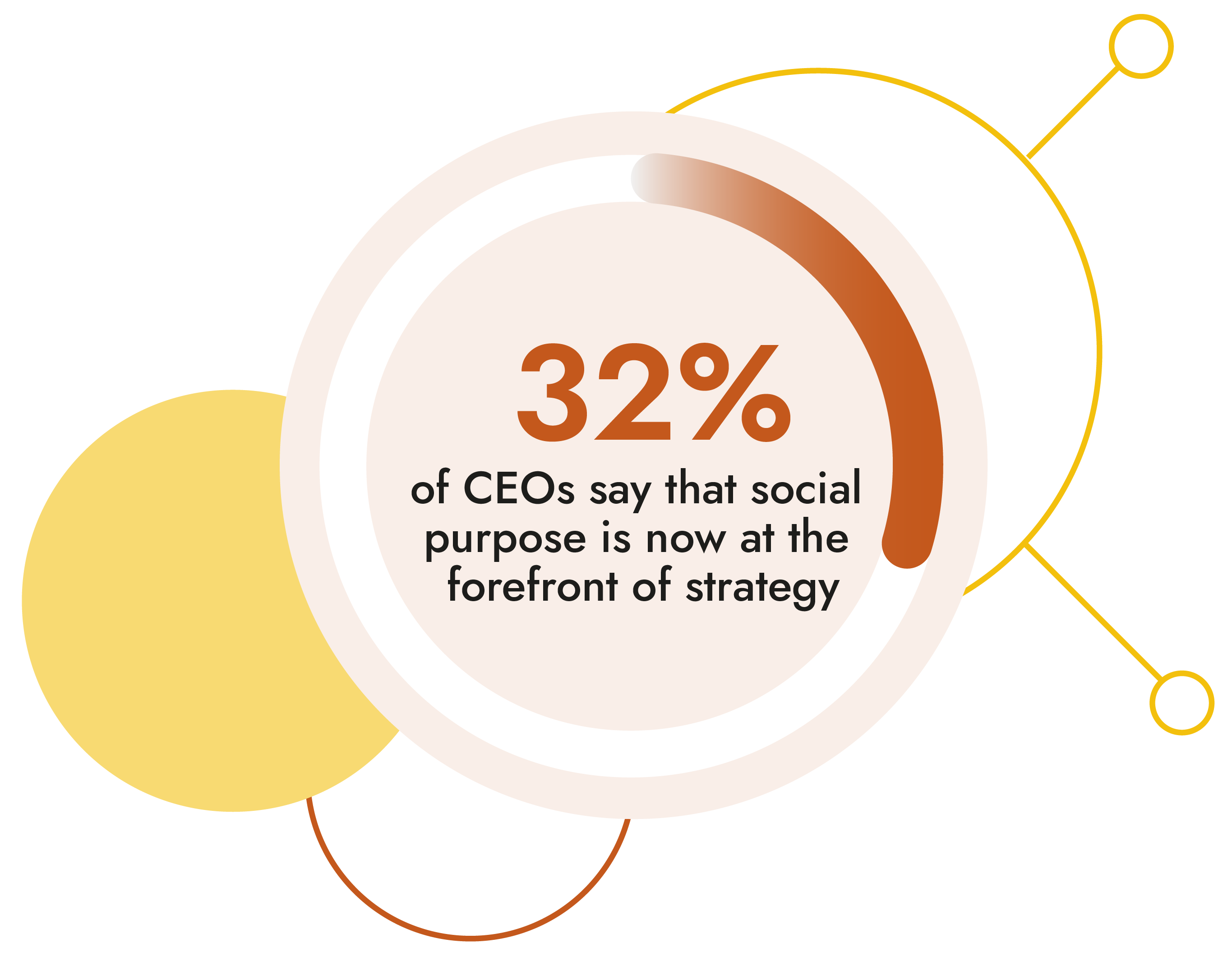
Evolution of social purpose
As CEOs navigated through the crisis of the pandemic, the importance of social purpose, business values, and looking out for your people became paramount. Businesses that may have talked about caring about more than just their profits, had their statements put to the test.

Almost a third say that social purpose is now at the forefront of strategy, rising to a whopping 95% for CEOs of smaller businesses between 10 and 49 employees. Nearly half of all fast-growth businesses we surveyed say that social purpose is one of the priorities that informs their strategy.



Planning for the future
Despite the challenges of the last year and a half, our research has shown that nearly half of CEOs are content in their current roles and plan to stay for the next five years. Although 1 in 5 business leaders plan to leave in the next year, the mean number of years that a CEO wants to stay in their business is 5.72 years, rising to 7.34 years in the technology sector.
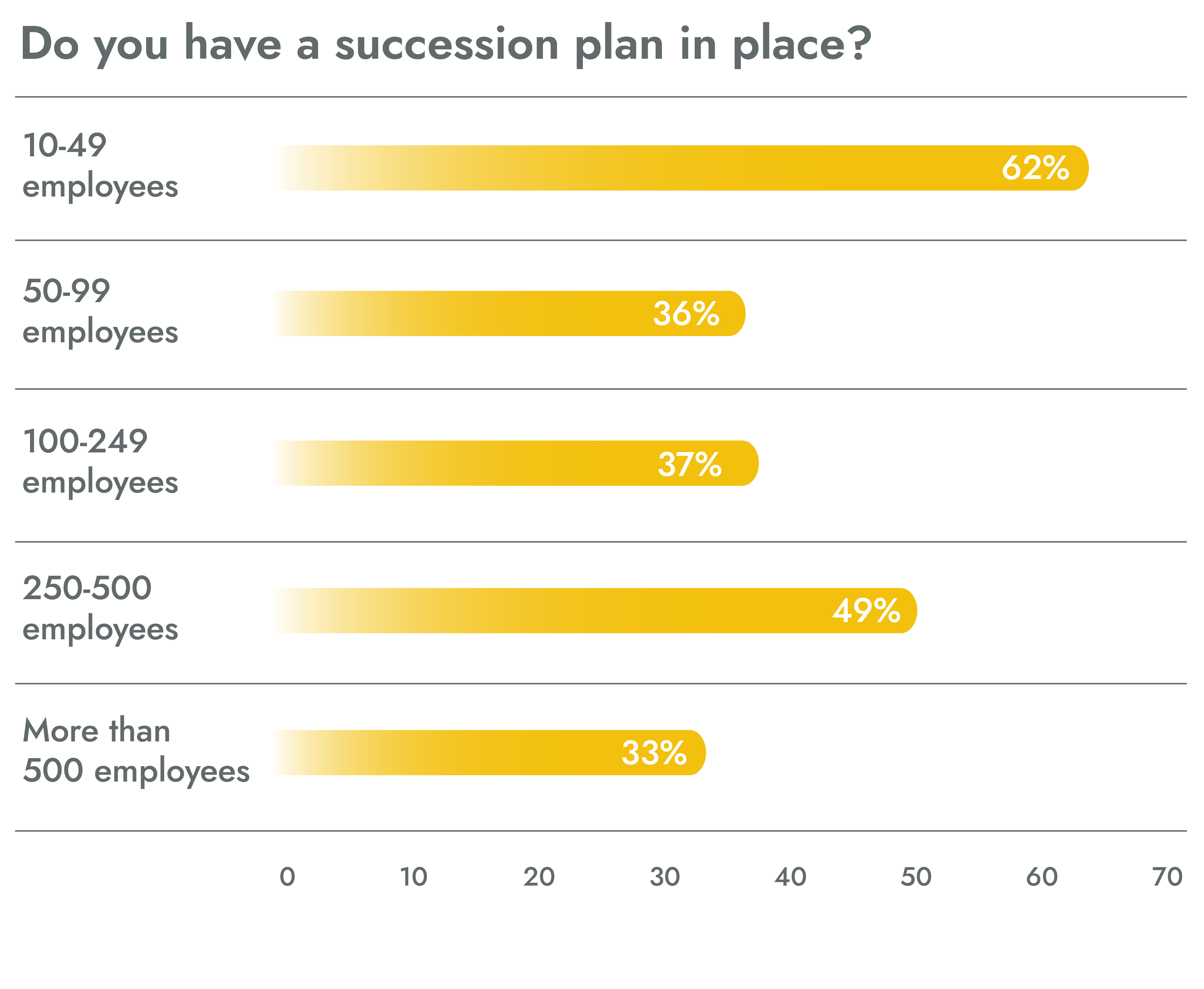
There are a number of end goals for their businesses on the cards, with 23% looking to sell a stake to a private equity investor and 19% looking to go public via an IPO.
Whether they are considering leaving or are staying put, succession planning is crucial, yet more than half of business leaders don’t have a succession plan in place. Smaller companies are more likely to have nailed this, with 62% of businesses with 10 to 49 employees having lined up successors, compared to just 1 in 3 of the largest companies we surveyed, where the choice of successor might be less obvious.
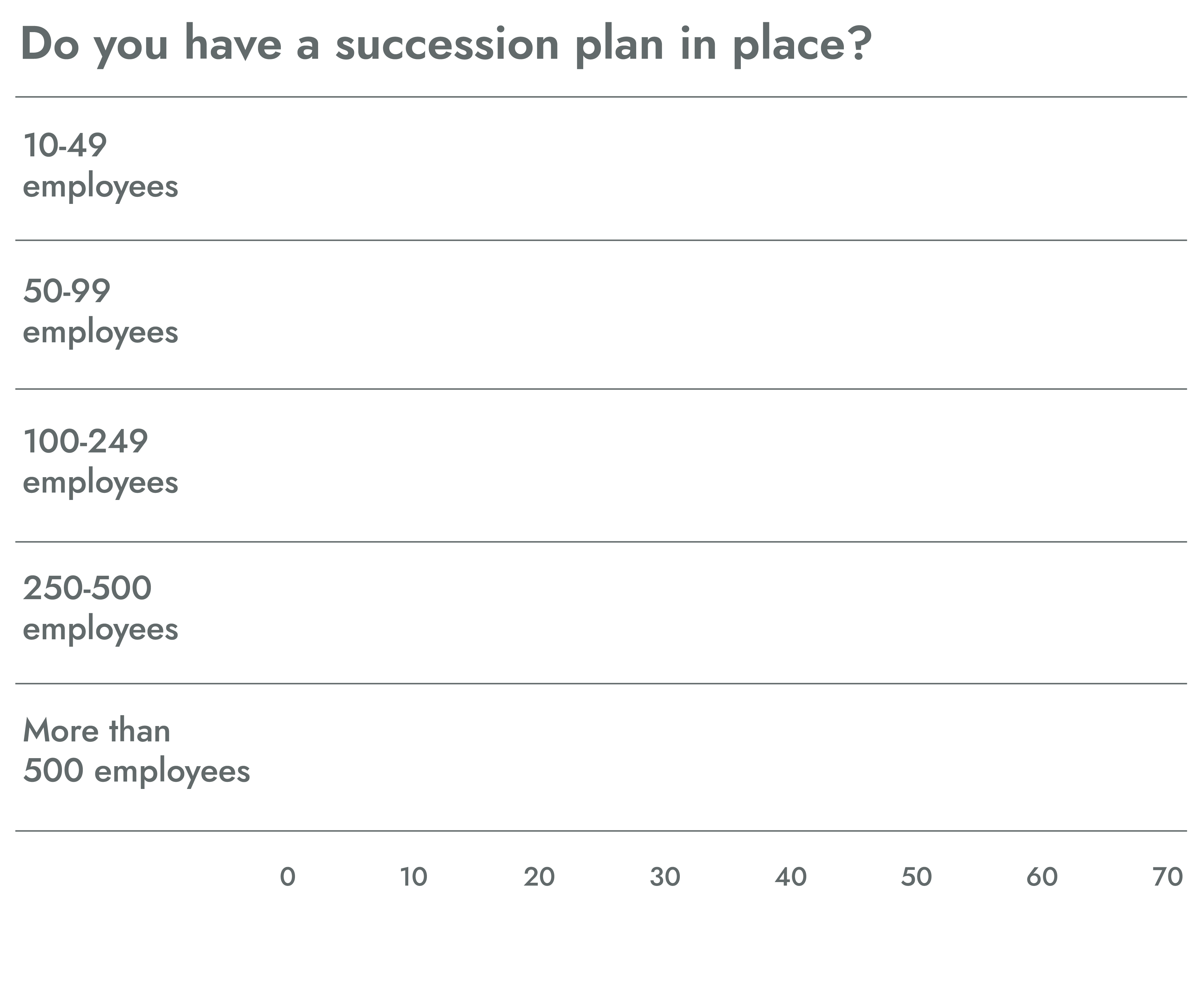



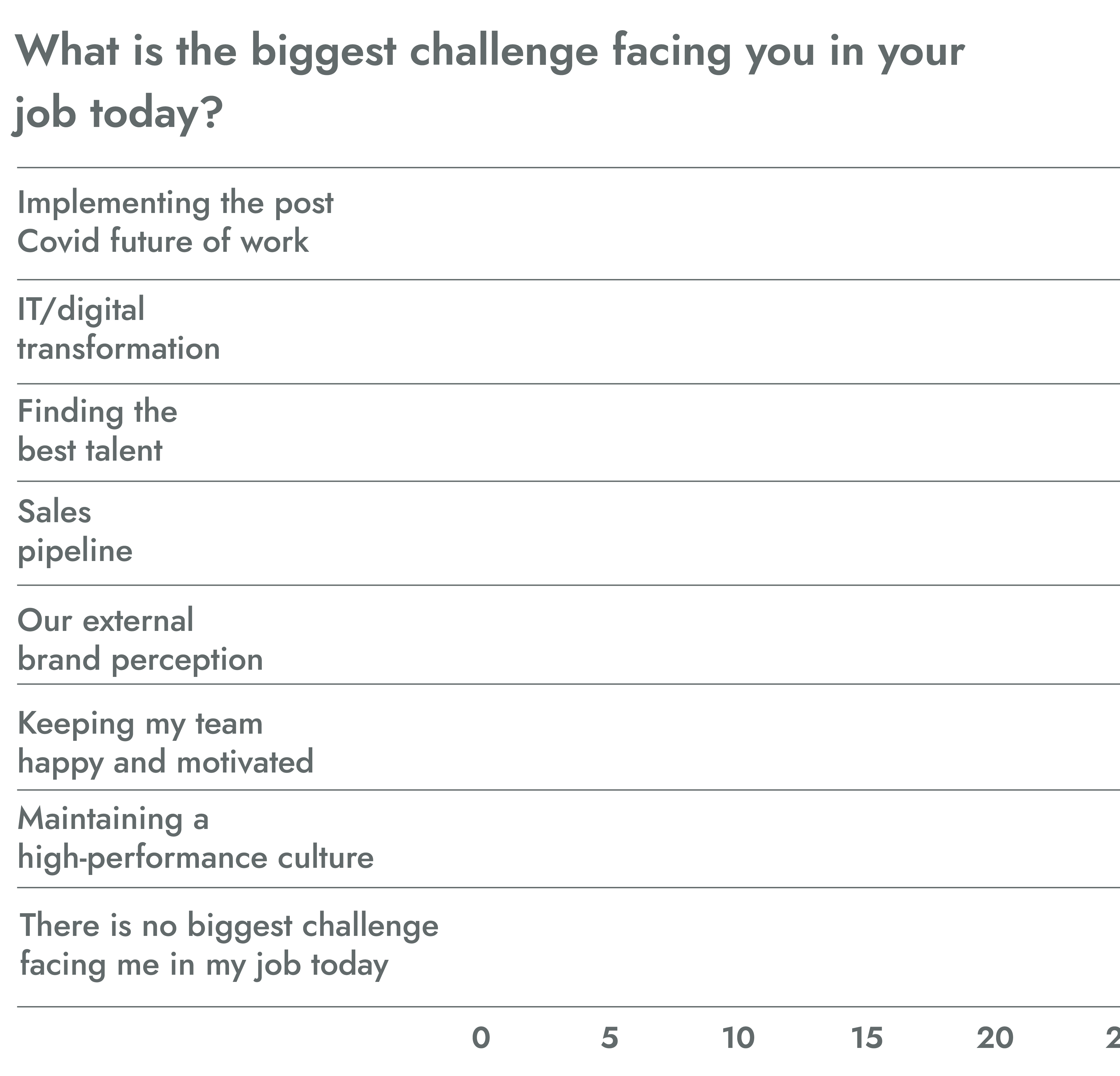
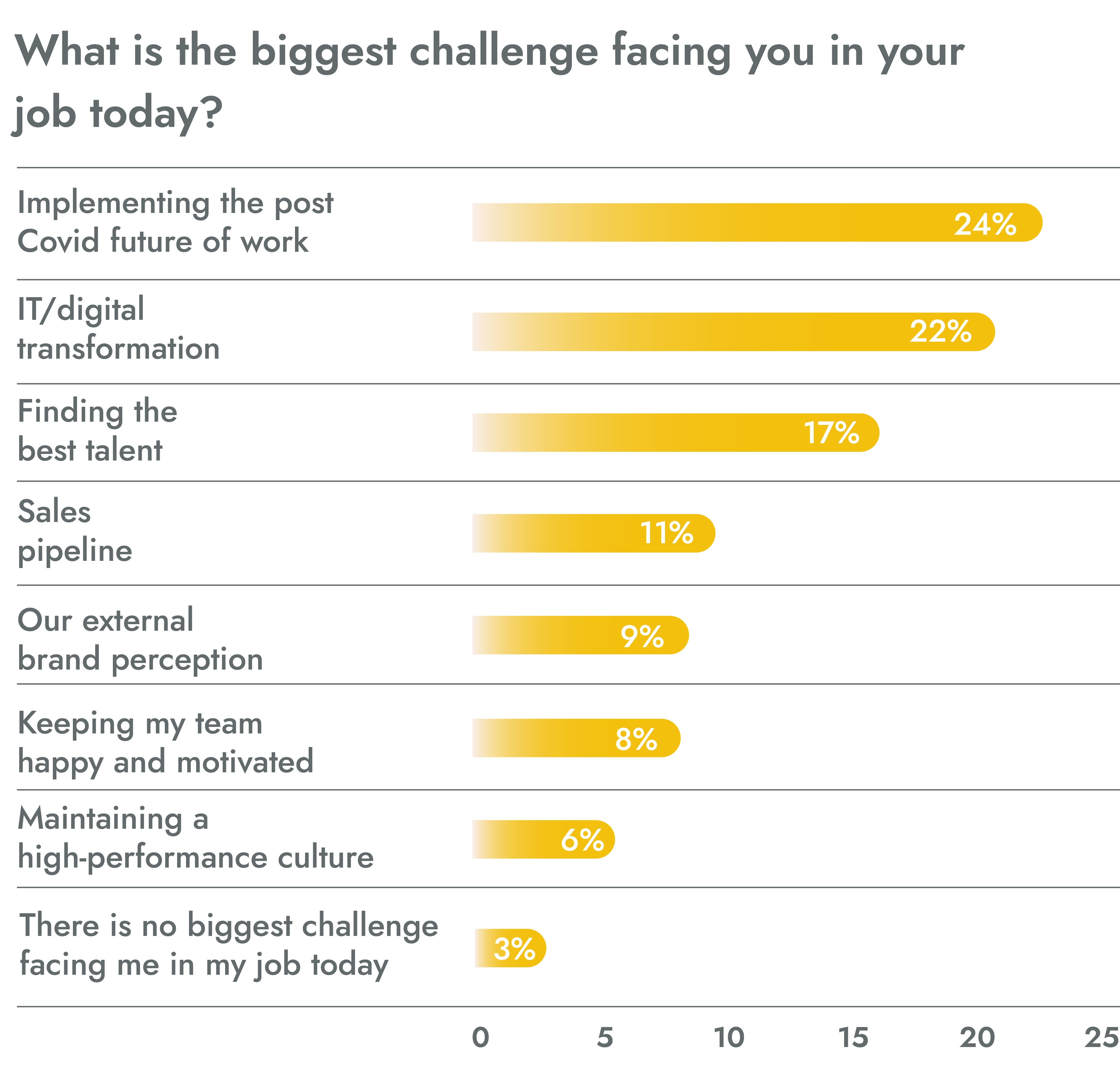

Outlook for CEOs
It is fantastic to see how CEOs have navigated the last year, and optimism is high, with nearly three-quarters of leaders saying that they feel more positive than this time last year.

It is perhaps unsurprising given that CEOs were surveyed at a time when the economy was recovering and the UK wasn’t in lockdown, but nearly a third say their optimism is significantly higher, and this is highest in subsectors such as education, retail and financial services.
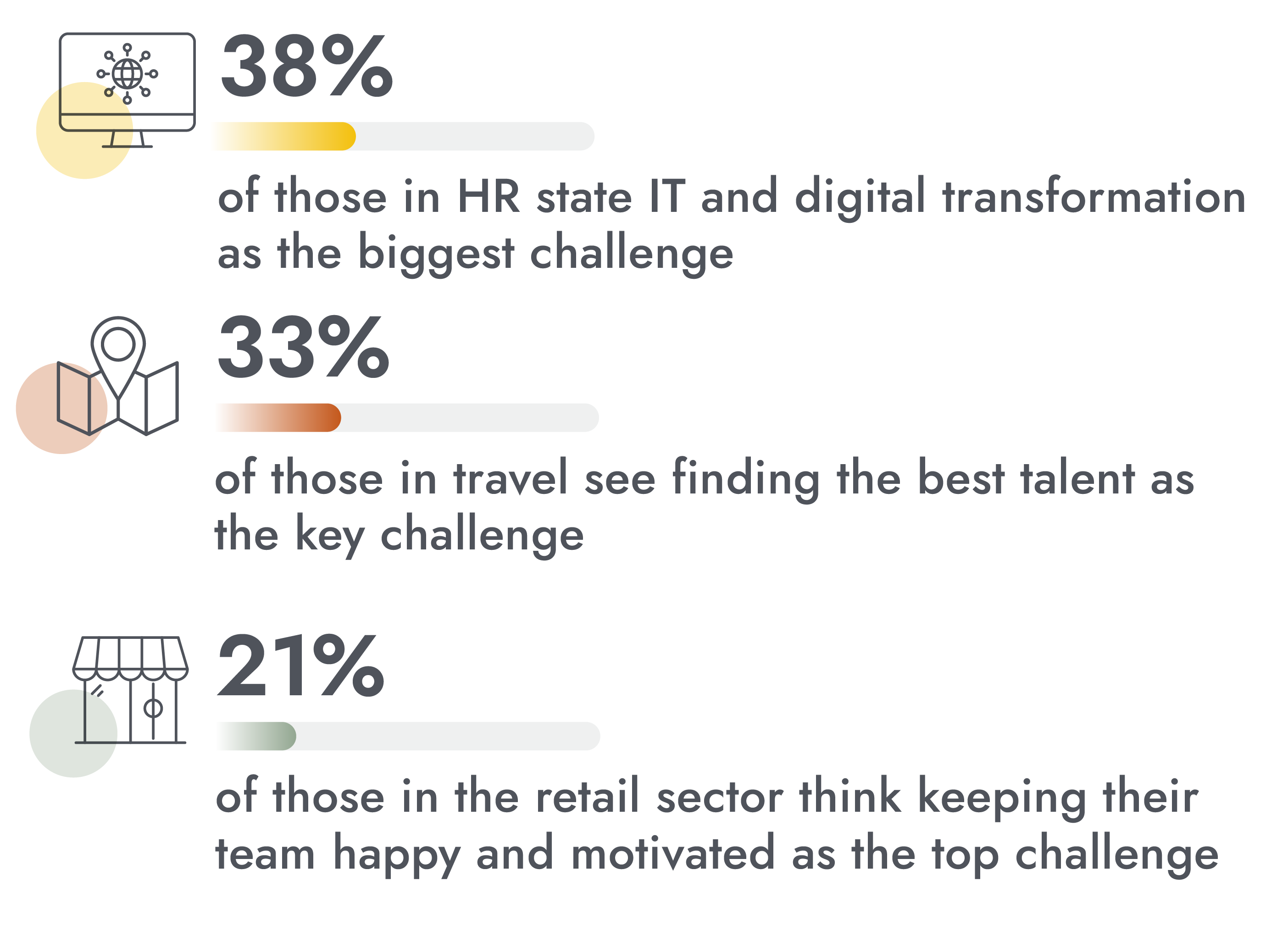
That’s not to say bosses aren’t aware that there are challenges ahead: the most frequent challenge cited by the leaders we surveyed is implementing the post-Covid future of work.
“This report has highlighted that growth CEOs favour realism when it comes to thinking about the challenges and opportunities ahead of them, which is why it is fantastic to see their optimism about the future of their businesses.
CEOs are emerging from the pandemic with more honest and open lines of communications to their teams, a renewed focus on social purpose, culture, and wellbeing. Those that have not just survived, but thrived, will have future-proofed businesses that are agile and ready to scale, whether their opportunity is domestic or on a more global scale.”


“This report has highlighted that growth CEOs favour realism when it comes to thinking about the challenges and opportunities ahead of them, which is why it is fantastic to see their optimism about the future of their businesses.
CEOs are emerging from the pandemic with more honest and open lines of communications to their teams, a renewed focus on social purpose, culture, and wellbeing. Those that have not just survived, but thrived, will have future-proofed businesses that are agile and ready to scale, whether their opportunity is domestic or on a more global scale.”
ECI surveyed 508 CEOs from fast growing SME businesses across education, financial services, healthcare, HR, legal services, professional services, retail and consumer goods, technology, and travel and leisure sectors . Respondents were surveyed in Autumn 2021 regarding their views on what makes a successful CEO, key traits, the skills they had to develop most, biggest challenges, and their plans for the future.


